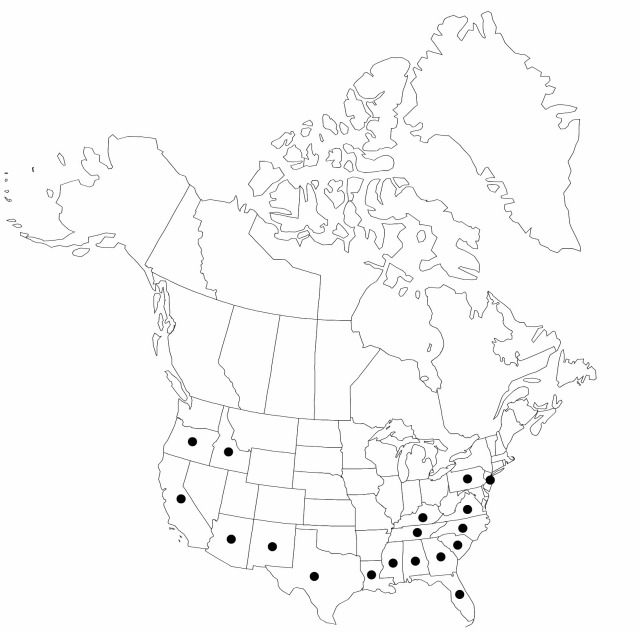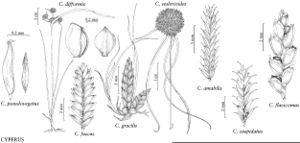Cyperus difformis
Cent. Pl. II, 6. 1756.
Herbs, annual, cespitose. Culms 1–15, trigonous, 7–30 cm × 1.2–2.5 mm, soft (flattened in pressing), glabrous. Leaves 2–7, flat, (2–)7–22 cm × 2.2–4 mm. Inflorescences: heads dense, 7–17 mm diam.; when rays short, heads sessile or nearly so, then densely irregularly lobate, 12–35 mm diam.; rays 1–5, 2–32 mm; bracts 2–4, longest bract erect or nearly so, appearing as continuation of culm, other bracts horizontal to ascending, 1–22 cm × 0.5–3.5 mm, margins and keel minutely scabridulous. Spikelets 30–120, greenish brown to purplish brown, oblong-ellipsoid, compressed, (2–)3–5(–6) × 0.8–1.2 mm; floral scales (6–)12–20(–30), laterally clear margins, stramineous to deep purple, medially greenish, stramineous, or purplish, laterally ribless, medially 3-ribbed, obovate to orbiculate, 0.6–0.8 × 0.6–0.8 mm, apex mucronulate. Flowers: stamens 1 or 2; anthers ovoid-ellipsoid, 0.1 mm, connective not prolonged; styles 0.1 mm; stigmas 0.1–0.3 mm. Achenes light brown, obovoid-ellipsoid, 0.6–0.8 × 0.3–0.4 mm (as long as subtending scale), base cuneate, apex obtuse, apiculate, surfaces finely reticulate, papillose.
Phenology: Fruiting summer.
Habitat: Disturbed, muddy soils, shallow waters
Elevation: 0–1000 m
Distribution

Ala., Ariz., Calif., Fla., Ga., Idaho, Ky., La., Miss., N.J., N.Mex., N.C., Oreg., Pa., S.C., Tenn., Tex., Va., Mexico, West Indies (Puerto Rico), Central America (Nicaragua, Panama), South America, Eurasia, Indian Ocean Islands, Pacific Islands, Australia.
Discussion
Cyperus difformis is naturalized in the New World and native to the Old World, where it ranges from southern Europe to southern Africa and eastward to Southeast Asia and Australia.
Selected References
None.
